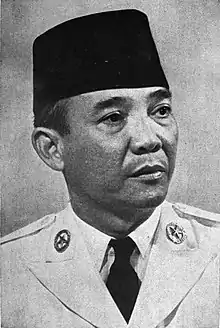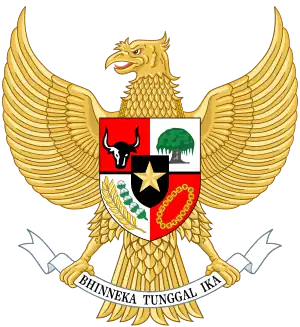Wilopo Cabinet
The Wilopo Cabinet was an Indonesian cabinet that served from 1 April 1952 until 3 June 1953.
Wilopo Cabinet Kabinet Wilopo | |
|---|---|
14th Cabinet of Indonesia | |
| Indonesian Government (Executive Branch) | |
.jpg.webp) The inauguration of the Wilopo Cabinet | |
| Date formed | 1 April 1952 |
| Date dissolved | 3 June 1953 |
| People and organisations | |
| Head of state | Sukarno |
| Head of government | Wilopo |
| History | |
| Predecessor | Sukiman Cabinet |
| Successor | First Ali Sastroamidjojo Cabinet |
| ||
|---|---|---|
|
Pre-Independence Domestic policy Foreign policy Media and legacy
|
||
Composition
Cabinet Leadership
- Prime Minister: Wilopo (Indonesian National Party – PNI)
- Deputy Prime Minister: Prawoto Mangkusasmito (Masyumi Party)
Cabinet Members
- Minister of Foreign Affairs ad interim: Wilopo (Indonesian National Party - PNI)
- Minister of Home Affairs: Mohammad Roem (Masyumi Party)
- Minister of Defense: Sultan Hamengkubuwana IX
- Minister of Justice: Lukman Wiriadinata (Socialist Party of Indonesia - PSI)
- Minister of Information: Arnold Mononutu (Indonesian National Party – PNI)
- Minister of Finance: Sumitro Djojohadikusumo (Socialist Party of Indonesia - PSI)
- Minister of Agriculture: Mohammad Sardjan (Masyumi Party)
- Minister of Economic Affairs: Soemanang Soerjowinoto (Indonesian National Party – PNI)
- Minister of Transport: Djuanda
- Minister of Public Works and Power: Suwarto (PKRI)
- Minister of Labor: Iskandar Tedjasukmana (Labour Party)
- Minister of Social Affairs: Anwar Tjokroaminoto (Indonesian Islamic Union Party - PSII)
- Minister of Education & Culture: Bahder Djohan
- Minister of Religious Affairs: Fakih Usman (Masyumi Party)
- Minister of Health: Dr. Johannes Leimena (Parkindo)
- Minister of Employee Affairs: R. P. Soeroso (Parindra)
Tenure
17 October affair
The Wilopo Cabinet's proposals to reorganize the army to conserve budgets were unpopular with the army. The Army's high command came into dispute with the parliament in what it saw as excessive civilian meddling within military affairs. After a dismissal of a pro-government officer in July 1952, the parliament began demanding a significant restructuring of armed forces leadership, and after three months tensions culminated in thousands of demonstrators mobilized by the army in Jakarta. President Sukarno managed to temper the demonstrators and assure the army officers, but refused to concede to any demands. Soon after the incident, a significant proportion of the army's high command was replaced.
Tanjung Morawa affair
On 16 March 1953, a clash between peasant squatters and the police occurred in Tanjung Morawa, North Sumatra. The incident, known as the Tanjung Morawa affair, resulted in the downfall of the cabinet.
Changes
- Mukarto Notowidagdo (PNI) was appointed Minister of Foreign Affairs on 29 April 1952, releasing Wilopo from his dual role.
- On 11 May 1953 Social Minister Anwar Tjokroaminoto resigned and was replaced by Employee Affairs Minister Suroso. Responsibility for employee affairs was transferred to Prime Minister.
- On 2 January 1953 Defense Minister Sultan Hamengkubuwana IX resigned and Prime Minister Wilopo became ad interim Defense Minister.
References
Bibliography
- Simanjuntak, P. N. H. (2003). Kabinet-Kabinet Republik Indonesia: Dari Awal Kemerdekaan Sampai Reformasi (in Indonesian). Jakarta: Djambatan. pp. 125–133. ISBN 979-428-499-8.
- Feith, Herbert (2009) [1958]. The Wilopo Cabinet, 1952-1953: A Turning Point in Post-Revolutionary Indonesia (Reprint ed.). Equinox Publishing. ISBN 978-602-8397-15-5.


